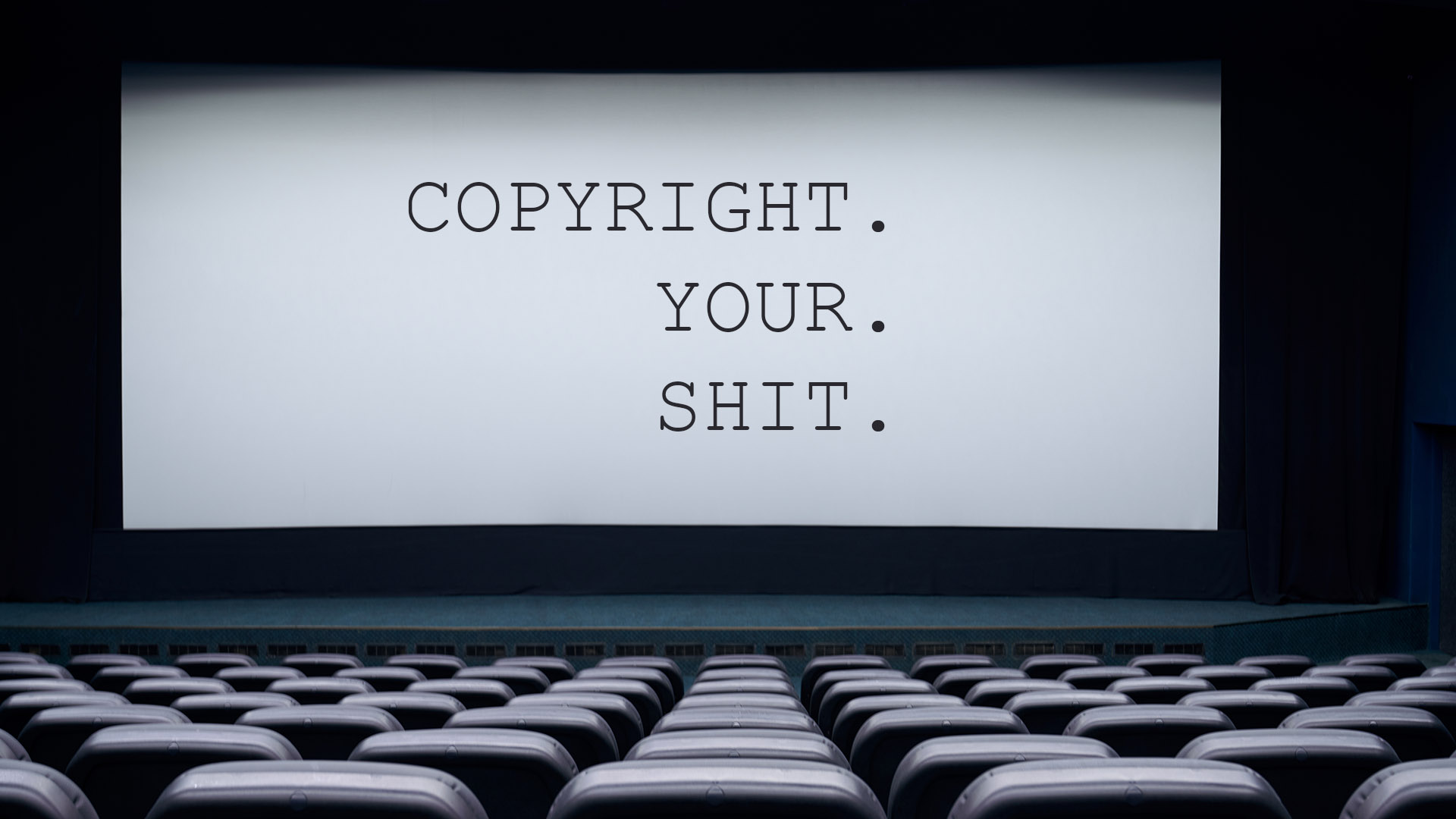How do I copyright a screenplay?
A Simple Guide To Copyright For Screenwriters
IL DISCLAIMER LEGALE:
THIS GUIDE TO COPYRIGHT FOR SCREENWRITERS IS NOT WRITTEN BY A LAWYER, JUST SOMEONE WITH A LOT OF EXPERIENCE IN THESE THINGS ON THE BUSINESS SIDE.
WHENEVER ACTUAL MONEY OR A RIGHTS TRANSFER IS INVOLVED, ALWAYS CONSULT A REAL LAWYER (PREFERABLY AN EXPERIENCED ENTERTAINMENT OR INTELLECTUAL PROPERTY ATTORNEY).
NOW, LET’S START BY SAYING…
Copyright.
Your.
Shit.
You have an inherent right to control and profit from any original work you independently generate, but what you need in place to protect that right is serious motherfucking documentation.
In the United States, if you created a work of art, whether it’s taking a photograph, doodling a sketch, or laboring out the first sentence of a screenplay, then you automatically own the copyright on that work. However, you may have trouble proving that, so read on…
If you get into a situation where someone is claiming your work as their own, you want some evidence to take with you to court. Basically, the best evidence of authorship is a registered copyright.
By holding registered copyright, if you need to go to court, essentially your witness is the Library of Congress. The usefulness of being in this position cannot be overstated.
So, when in doubt, always pay the fee and get the thing.
How do you copyright a screenplay? Here’s what you do:
- To copyright a screenplay, start by going to https://eco.copyright.gov/
- Set up an account, and make sure you save your copyright.gov login information in a safe place
- for Register a Work select Standard Application if you are collaborating with another writer, or One Work One Author if you are the sole writer (slightly less expensive)
- for Type of Work select “work of the performing arts”
- for Titles click “New” and type in your title
- keep hitting “Next” until you’ve finished checking out and have paid the registration fee
Important notes:
Hit Next
For some reason, the “Next” button is at the top of the screen, so you have to scroll back up to go to the next step each time.
Work For Hire
If you’re doing “Work For Hire,” the copyright may belong to your employer (based on your employment contract language). If you plan to work on side projects while employed by a studio, make sure they don’t own your side hustle. Again, consult an entertainment lawyer.
WGA Registration
Some people may tell you to register your shit with the Writers Guild of America West (WGA).
WGA registration is definitely not a substitute for federal copyright registration.
WGA registration only provides limited added protection in certain situations.
But It’s Unfinished / Unpublished…
Copyright and Registered Copyright cover both published and unpublished works.
You can file an update on a registered work if it has been modified since the original filing.
The last time we checked, it cost about $35 to file an update.
Other People’s Shit
Don’t rip other people’s shit off.
If you want to make Citizen Kane II: Rosebud’s Revenge, you need permission from the rights holders to create a derivative work.
As a new writer, you just aren’t going to get those rights without weird extenuating circumstances, so basing your script on someone else’s work, unless it’s clearly in the public domain, is a complete waste of time and energy, and you won’t be able to sell it.
The Foreigner
If you live outside the United States and it’s awkward to register copyright locally, you can likely still register your work with the US Copyright Office. Most nations operate with mutually recognized copyright treaties.
“An eligible source country is a country, other than the United States, that is a member of the WTO, a member of the Berne Convention for the Protection of Literary and Artistic Works, or subject to a presidential proclamation…” – LoC Circular 38B
Here is the official list of countries with whom the USA has a copyright treaty in place: LoC Circular 38A
“Can I copyright my idea?”
No, you cannot copyright “an idea,” you need to actually do the work of writing out a specific narrative.
Even if it’s just a one-page or five-page treatment, or some sort of short story, you still need to have more than just “shark guy in board shorts terrorizes Ohio.” What happens to him? How do people react to him? How did he get there? Flesh it out.
A narrative is more than just a situational premise or inciting incident. You need to string together a bunch of ideas in words people can read to be able to register copyright on narrative work. An interplay of multiple ideas is what is considered unique and protectable for these purposes.
“Copyright 2021, The Noob”
Some people will say putting the copyright notice on your title page makes you look like an amateur. Ignore them, they’re not lawyers.
From the beginning of the work on a screenplay, you can immediately write “Copyright {year}, {your name}” on your title page, and you should do that.
“Copyright {your name} {year}” also works.
However, don’t put your registration numbers on the script (LoC or WGA). You are the only person who needs that information until you file a lawsuit.
NDA?
Non-Disclosure Agreements are not helpful when you’re trying to sell your script.
Unless you’ve made it up to the Aaron Sorkin level of success, don’t ask a serious producer to sign an NDA.
You don’t want to be projecting “Hey, look at me, I’m litigious!” It’s a rookie move that will get you nowhere. If you have the copyright registered, that’s your protection.
If you want to hear basically the same information presented here, but from an actual lawyer, consult Stanley B Gill’s website.
Read more about entertainment lawyers.
Continue Browsing:
[su_menu name=”Main”]

